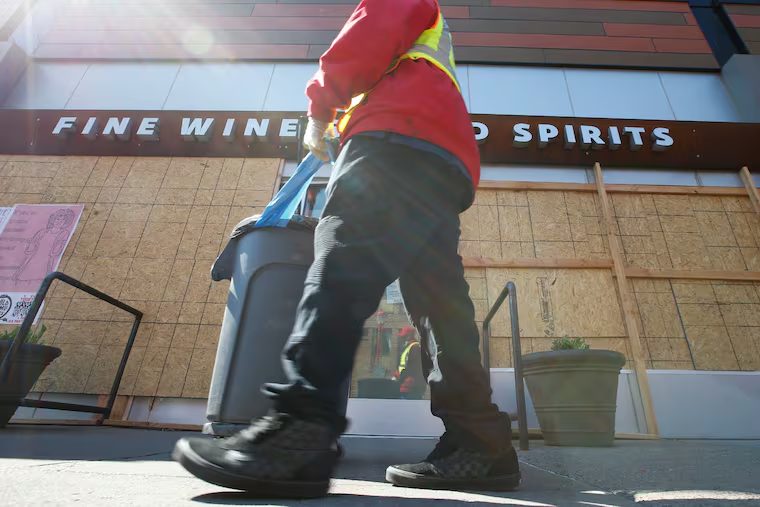The PLCB says it ‘geographically picked’ which liquor stores to reopen. Its decision ignored some Philadelphia neighborhoods.
The PLCB had chosen to reopen stores in the whitest areas. In black and Hispanic neighborhoods, where most stores are located and where sales are sometimes highest, it opened none.

When the Pennsylvania Liquor Control Board reopened some of its stores this week for curbside pickup after a complete closure for the coronavirus last month, a clear pattern emerged in Philadelphia: The reopened stores were in the city’s whitest areas.
Most of the 52 liquor stores in Philadelphia are in black and Hispanic neighborhoods, but the PLCB didn’t reopen those.
Instead, it opened only its 10 “Premium Collection” stores, which feature a wider and higher-end product selection, even while it left closed some standard stores with better sales records and more transactions. In other parts of the state, including Bucks County, the PLCB reopened standard stores in addition to Premium Collection stores.
Nearly all of the state’s liquor stores will reopen on Monday, including 48 in Philadelphia.
When asked last week how the PLCB picked the stores to reopen first, press secretary Shawn Kelly said: “They were geographically picked. We tried to pick locations that would reach the most people.”
Asked whether any other criteria were used, he said the stores were chosen “based on a number of factors, including population density, store sizes, product selection, and geographic coverage.” The PLCB did not consult with local officials in deciding which stores to reopen first.
The city’s Premium Collection stores are in Center City, South Philly, Northern Liberties, the Far Northeast, and Chestnut Hill. By opening only those Premium Collection stores, the PLCB’s decision excluded black and Hispanic neighborhoods in Philadelphia.
“You know what we call that? Structural racism,” said Diane Sicotte, a Drexel University sociologist.
“I’m betting that nobody made a conscious decision that we don’t want to serve black people,” said Sicotte, who studies environmental injustice and urban inequalities. “But in effect, when you decide to only reopen the premium liquor stores, and the premium liquor stores are only located in affluent white areas, then the decision you make has the same effect.”
Neighborhoods with primarily white residents were closer to reopened liquor stores than were neighborhoods with primarily residents of color, meaning those residents would have to travel farther to access a store’s services. Five reopened stores in Philadelphia are clustered in just one square mile in a city of 142 square miles.
When asked for more detail on how the decision was made, and for a response to the racial disparities it created, Kelly said that the decision was not “racially motivated.”
Where reopened stores are, and where they aren’t
Store #5132, on North Broad Street, remained closed last week, but there was clear demand for alcohol there. Two men stood outside Wednesday peddling Grey Goose, Franzia, and pink champagne to residents of North Philly, an area primarily made up of black and Hispanic residents.
Six miles northwest is store #5121 in Chestnut Hill, one of the city's most expensive neighborhoods and one with primarily white residents. The store was converted to a Premium Collection in 2014 and, after an initial spike in sales, has brought in less revenue and had fewer transactions than some standard stores, including store #5132.
The Premium Collection shop in Chestnut Hill is nearly invisible from the street, though lucky patrons whose calls made it through the busy signal could be seen carrying away boxes of booze.
If locals couldn’t get through to store #5121, there’s another reopened shop five minutes away in Flourtown. There are two more in Maple Glen and North Wales, 15 minutes up Route 309.
Contrast that with the broad swaths of Philadelphia that had no reopened stores. None were reopened west of the Schuylkill. None in Germantown or Mount Airy, Port Richmond or Frankford. In the northernmost parts of North Philly, residents were at least five miles from the closest open stores.
Seven of the 10 reopened stores were among the city’s top 10 sales-generating stores. But several with higher total sales and more transactions — including stores in North, Southwest, and West Philadelphia — were left closed.
Take store #5147 in North Philadelphia’s Hunting Park neighborhood. Its sales figures and transactions have increased significantly since 2013. In the latest fiscal year, it saw more than $7.1 million in sales — $1.3 million more than the reopened South 11th Street store by Passyunk Square and $2.1 million more than the Chestnut Hill store.
In fact, it has outsold the Chestnut Hill store by more than a million dollars each year since 2016.
Geography isn't neutral
The PLCB said the reopenings were “geographically picked.”
But geography isn’t race-neutral, said Paul Jargowsky, a public policy professor and director of Rutgers-Camden’s Center for Urban Research and Education. He noted that Philadelphia has a strong history of redlining and racial housing discrimination.
“Geographic distribution in major cities in the United States is a racial distribution,” he said. “You just can’t disentangle them.”
Kelly, the PLCB spokesperson, said it was "shameful for The Inquirer to try to racialize our attempts at balancing the protection of our employees’ and customers’ health and safety with providing Pennsylvanians access to wine and spirits during this unprecedented public health crisis.”
The effect of the decision matters regardless of intent, Jargowsky said. “It may not be racially motivated, but it has a disparate impact racially,” he said. “They have to deal with that.”